WOHESC
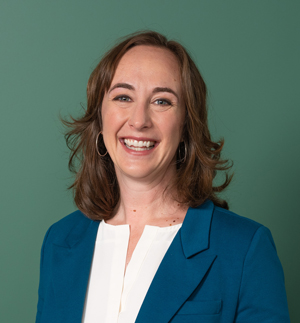 Keynote Interview with
Keynote Interview with
Elizabeth Bagley, Director of Programs, SEI
Q: We look forward to your WOHESC Keynote Address in March 2022. As recently appointed Program Director at SEI, you are partnering with higher education institutions to build sustainability leadership. What are the key ways that you are doing this? How can our WOHESC institutions get involved in this process?
At SEI, we know that there is no one-size-fits-all approach to building sustainability leaders. Our sustainability journeys all start and meander in different ways, so we provide people with multiple onramps for building their sustainability leadership journey. As part of SEI's Energize Colleges program, we partner with higher education institutions like community and four year colleges and universities to provide opportunities to both build sustainability leaders and to improve the operational sustainability on campuses.
Faculty members tell us that they need time, money, and materials to create course content that builds the sustainability leaders we need to implement climate solutions quickly, safely, and equitably. We secure grant funding in order to provide financial support, materials, and SEI staff time for faculty members to create project-based energy curriculum that engages college-level students in sustainability topics and teaches valuable career skills. Since 2016 we have co-created 25+ courses ranging from survey courses like Integrating Energy and Climate Change into Environmental Education to technical courses like Energy Conservation Methods for HVAC Lab.
We have been running an incredibly impactful Climate Corps program for over a decade, and we integrate that program with our higher education work by placing Climate Corps Energize Colleges Fellows, usually recent college graduates, on college campuses such as Bellevue College, where they join a cohort of emerging sustainability leaders to drive environmental change on campus and within their communities. Our paid, full-time Fellows collaborate with campus faculty and staff to implement climate change mitigation and resilience projects and support paid, hands-on internships for current college students.
To ensure that higher education faculty and staff have access to the latest information and tools in the sustainability field, we also lead trainings and partner with expert trainers in the sustainability industry to share content on a variety of topics including Building the California Energy Efficiency and Demand Management Workforce, Energy Efficiency Work in the Time of COVID-19, and Campus as a Living Lab Train the Trainer.
Q: How is SEI incorporating your commitment to diversity, equity and inclusion to the above process and working to remove systems of oppression in all aspects of your work?
SEI engages, inspires and empowers youth through experiential education and climate action from early childhood to early career. These individuals should be representative of all communities, but especially those disproportionately impacted by climate change. By creating a bridge for cultivated skills and leadership into the workforce, SEI is dedicated to the vision of a sustainable world where all communities thrive.
Through the continued development of inclusionary practices, and a focus on racial equity in particular, SEI is working to amplify and center voices from marginalized communities - especially those who are disproportionately burdened with the effects of climate change - as the most impactful way to advance equity. We recognize in particular, the systematic silencing, undermining, and erasure of Black, Latinx and Indigenous voices stemming from a nation built on exploitation and violence to these communities, and from the systems rooted in anti-Blackness and Indigenous genocide that have served to perpetuate racial inequities. Recognizing these barriers to equity, along with the resilience modeled by these communities, SEI strives to center these voices, and provide explicit opportunities to include them in meaningful decision-making within the organization.
Here are some of the actions we are taking to take in our work to identify and remove systems of oppression:
- Foster a culture of listening so that we may more deeply understand the needs of the individuals and communities we serve
- Grow and nurture long-term partnerships in frontline communities - those most vulnerable to climate change and disproportionate environmental burdens due to systemic racism
- Include voices of marginalized communities, particularly people of color, in programmatic planning and decision-making
- Offer education and workforce development that empower diverse and representational leadership in environmental career pathways
- Develop community and project-based environmental justice learning opportunities throughout our curriculum
Q: The Energize Colleges program at SEI helps build a highly qualified energy and sustainability workforce through paid internships and academic learning experiences by partnering with colleges and universities to provide opportunities for student sustainability career exploration. Currently this program is only for California based institutions - is there a chance this could someday expand into Oregon, Washington and the Cascadia region?
I am so glad you asked! We have actually been working in Washington and Oregon for a few years, and we are excited about building more sustainability leaders in the Pacific Northwest.
Within Oregon, a diverse group of organizations is partnering to develop an Oregon Climate Equity Project that will help diversify the climate movement in the state and strengthen BIPOC leadership in climate policy, advocacy, and development. In the Oregon Climate Equity Project, five recent-graduate Climate Corps Fellows focused on climate justice and the needs of BIPOC communities are being placed with nonprofit organizations and public agencies serving Oregon.
The Climate Corps-centered approach was chosen in part because of the success of the first Climate Corps Fellowship in the Pacific Northwest, with the Portland African American Leadership Forum (now known as Imagine Black) and the interest from other Oregon non-profits. This Fellow became an integral part of the PAALF team and helped develop connections between local agencies, launch new programs, identify and pursue funding opportunities, and provide support to other environmental justice groups. With the Oregon Climate Equity Project, we hope to continue this important work by replicating it at the environmental justice and BIPOC-focused organizations of the Oregon Climate Equity Project.
We will also be working closely with the University of Oregon's Tribal Climate Change Project in the coming year.
In Washington, we have supported a Climate Corps Fellow at Bellevue College, and we have recruited heavily from Western Washington University's energy programs at the undergraduate and graduate level.
Q: In your previous role at Project Drawdown you led Drawdown Learn, encouraging learning about climate solutions based on research, analysis, and insights. You also produced Climate Solutions 101 - the world's first major educational effort focused on actionable solutions. Can you tell us your main learning/takeaways/action achieved during your time there?
I am deeply grateful for the opportunity to work with the fabulous team at Project Drawdown. During my time there, I learned just how much people are craving actionable steps they can take to address the climate crisis. I also learned about the power of storytelling to motivate and inspire action and to provide opportunities for people to see people like themselves implementing climate solutions in their homes, communities, and businesses.
We created the Climate Solutions 101 video series as a way to share the science behind climate solutions. We had higher education faculty members asking us to give guest lectures about climate solutions because while the faculty members might understand the science behind the causes of climate change, they were not comfortable teaching about the science behind the solutions to climate change. Climate Solutions 101 helped us scale the important content, and the videos have been viewed by tens of thousands of people from all around the world. I am really proud of the content, and I look forward to working with the SEI team to build sustainability leaders who move climate solutions from the videos into communities around the world.
![]()
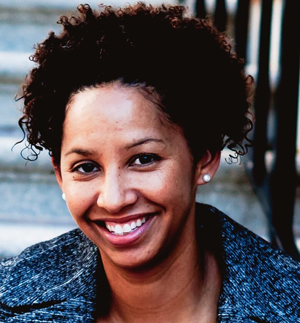 Keynote Interview with
Keynote Interview with
Jessica Yinka Thomas, President of B Academics
Q: The synergy between the vision of B Academics - to advance the state of academic study into business as a force for good - and our event as a platform for inspiring change, facilitating action, and promoting collaboration around sustainability and social justice - is very much in alignment. What inspired you and how did you begin to form your committed network of educators and researchers to help accelerate the sustainable business movement by studying the global B Corp movement?
I first learned about B Corps in 2009, when I was running a sustainable business accelerator at the Center for Sustainable Enterprise at UNC Kenan-Flagler Business school. I invited Bart Houlahan, one of the founders of B Lab, to UNC to speak to our Net Impact students. What I remember most was how strongly the students connected with the concept of a B Corporation, across disciplines. Since then, I've been working with like-minded colleagues to build a global network of educators, researchers, students and practitioners interested in studying and teaching about B Corps, benefit corporation and the broader business as a force for good movement, now B Academics. The goal is to share best practices in teaching, identify opportunities for collaborative research, and connect a global community of academics committed to building a more equitable, inclusive and regenerative economy.
In 2016, we hosted the first B Academics Roundtable at Wharton, in conjunction with the annual B Corp Champion events. Five years later, we now have over 2,000 people in our network from over 60 countries representing over 700 different organizations. In 2019, we became a nonprofit organization incorporated here in the US to formalize and scale our impact. I now serve as president of B Academics where I work with a committed group of colleagues, our global board of directors, to host events, share resources and engage with partners to accelerate the sustainable business movement. As we prepare our students to lead and innovate in the future of business, I think this community is more and more relevant and necessary every day.
Q:Our students (35% of our attending audience at WOHESC) would like to hear more about the B Corp Clinic - where multidisciplinary students work with aspiring and certified B Corps to drive social and environmental impact. How does this work and can students from anywhere apply to get involved?
About six years ago a group of students met with me to share that they were interested in working with companies in the local community to help them improve their social and environmental impact. The same week, the director of HQ Raleigh (now Raleigh Founded, a local business incubator), Liz Tracy, asked me if I had any students who might be interested in working with them to become a certified B Corp. I had been studying and teaching about B Corps for several years at that point and saw an opportunity to bring the two parties together. We ran a pilot of what has now become the B Corp Clinic that summer. We're now wrapping up our 13th semester of the B Corp Clinic where we've engaged students from 10 different colleges on real world consulting projects with local and global companies using the B Impact Assessment (BIA) as a framework for driving social and environmental impact. All of the companies we work with are focused on strengthening their impact and better engaging their stakeholders but not all are participating with the goal of becoming certified.
In the first four years of the program, the Clinic was open to undergraduate and graduate students from across disciplines, representing colleges and universities across the state of North Carolina, public and private, HBCUs and community colleges. More recently the Clinic has become the practicum component of an MBA sustainable business strategy course that I teach and is only open to graduate students at NC State. We've now worked on almost 80 projects, engaging over 400 students in the program. A recent article in B the Change, shares examples of projects from the Spring 2020 Clinic. Although there isn't currently an opportunity for students outside NC State to participate in our B Corp Clinic, we have been working with colleagues to replicate and adapt the Clinic at academic institutions across the country through our B Impact Teams Workshop. Colleagues at University of New Hampshire, University of Florida, University of Georgia, University of Alabama, Lenoir Rhyne University and others are building their own version of the Clinic and we're always interested in working with other academic institutions.
Q:Your Business School Collaborative at North Carolina State University shares that business school professors are finding an enthusiastic audience to reshape the global economy into one built on stakeholder capitalism. How are you seeing college students (most likely to be affected by changes to the economy as the workers, consumers, and community members of the future) seizing new opportunities to build their knowledge and experience by engaging with B Corporations?
Here at NC State, students have many opportunities to engage with B Corps in addition to the B Corp Clinic. Our faculty are inviting B Corp leaders to campus to speak. For example, I've welcomed on several occasions Lauren Ginsberg, a Poole College alum from Athleta, a Gap brand that is B Corp certified, to speak in my undergraduate business ethics class. The Poole College Business Sustainability Collaborative, where I serve as director, hosts an annual speed networking event with impact entrepreneurs every year during Global Entrepreneurship Week, where many of the speed networkers represent certified B Corps.
Based on experiences like these, my colleagues and I are seeing students more likely to seek out B Corps when they're making purchasing decisions. Students are increasingly looking for jobs at B Corps including on the B Corp jobs site B Work. We're seeing alumni working with their companies to help them become B Corp certified and getting involved in their local B Corp community board. One of my former students is developing an analytics dashboard to help companies align their bottom line metrics with the data gathered in the B Impact Assessment. Most of all, students are translating these experiences to more traditional roles and organizations where they're acting as changemakers.
B Corps and the B Corp movement provides a clear, comprehensive, rigorous framework for measuring and improving impact across key stakeholders, a visible and well-recognized community of innovative leaders who inspire students and a global movement of businesses working to address climate change, inequity and many of the other global challenges that we face. They're inspiring the next generation of social entrepreneurs, purpose-driven business leaders, engaged community members, progressive policy makers, impact investors and conscious consumers to build a world that sustains and connects people and the planet, using business as a force for good.
![]()
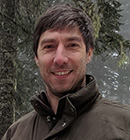 PC Team Interview Series: A Conversation with Brandon Trelstad, Oregon State University Sustainability Officer
PC Team Interview Series: A Conversation with Brandon Trelstad, Oregon State University Sustainability Officer
2020 was a very challenging year with the COVID-19 pandemic affecting everyone. How has this life-changing global event impacted you and the Oregon State University Sustainability Office? Is there a silver lining for you?
I'm proud of my team in the Sustainability Office, and really for our entire larger department of Capital Planning and Development, for how well everyone seems to have adapted to the remote work environment. While it appears that people have adapted professionally very well, I know it comes at a personal cost for many. In the Sustainability Office, we are as busy as ever, shifting the time we spent on things like in person events to more long range planning, policy development, digital outreach and a focus on efficiency projects and renewable energy infrastructure. It seems like we have filled up the "free" time with more than we can take on, but I find this often happens with values-driven work. And there have been silver linings in things like our carbon footprint - our institution wide carbon emissions are down 13% since last year, mostly due to the proactive measures taken by our Facilities Services team in cooperation with the Sustainability Office. We have proactively and carefully adjusted heating and cooling settings in buildings to save a tremendous amount of energy, totaling over $1.5M in energy savings in just nine months. In fact, we produced a short, informal video about this work. Much of this fine tuning will result in savings that persist after the pandemic. And of course I think most of us have a new perspective on the need to travel, which will also reduce emissions in the long run.
As you know, WOHESC and many of our partner campuses on the Program Committee are prioritizing DEI initiatives as an intersectional and integral part of their work. Can you tell us what this looks like on the Oregon State University campus?
We have outstanding leadership at OSU in our Office of Institutional Diversity, the Equal Opportunity and Access department and many others doing this work. In 2020, core sustainability partners of Campus Recycling, Community Engagement & Leadership and the Sustainability Office came together to draft a diversity, equity, inclusion and justice plan for our groups to finalize in spring of 2021 and serve as a guide for all of our work. For several years, we have included social justice in our training and orientation process, as well as the continual learning process we provide all year to our residence hall Eco-Reps. With OSU requiring social justice training for all incoming students, faculty and staff now, it give us a good platform to do the more advanced work within our groups!
We saw that Oregon State made a commitment to be carbon neutral by 2025. Can you give us a preview of how you plan to get there?
There are many complexities of our path to carbon neutrality, but it can be boiled down to a few key elements we plan to implement in the next 5 years or so:
- A projected 35% reduction in direct emissions through energy conservation, renewables, changes in transportation practices and other measures (a graph is attached so hopefully that can be posted on the blog!)
- Partnerships with our local utility companies and others to develop and/or purchase utility scale renewable energy projects
- Over time, electrification of more campus infrastructure
- A small amount of local carbon offsets for remaining emissions from things like air travel.
In the long run, our plan is to be ready for wave energy, small scale nuclear, smart power grids and other emerging technologies to minimize our reliance on carbon offsets.
Including your above carbon neutral commitments, which is awesome - what other initiatives and plans are you most excited about moving the needle forward on sustainability in 2021 and beyond?
So much of what we do centers on equitable reduction of carbon emissions, but I'm also excited to get back on track to zero waste and more sustainable purchasing practices. OSU made national news in 2016 for our award winning Eco2Go reusable food container program. We've temporarily stopped the program due to the pandemic, but hope we can get it going again even before the pandemic is over since the issue is really with customer perception, not with the actual safety of the program. It had to be sanitary and food safe before, so it would meet all pandemic requirements. In addition to waste reduction and purchasing, I'm excited about the diversity, equity, inclusion and justice work I mentioned above! On a personal level, and because of long-ago family connections, I hope to engage more of my work and personal time connecting more deeply with local indigenous populations.

![]()
WOHESC PC Team Interview with Adam Maurer Sustainability Coordinator, Seattle Colleges
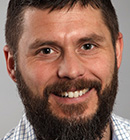 The planning committee behind the Washington Oregon Higher Education Sustainability Conference continues to work hard behind the scenes to make sure that each year, WOHESC brings attendees timely, relevant, inspiring and actionable content. We had the chance to talk with PC team member Adam Maurer- Sustainability Coordinator at Seattle Colleges and now host campus for the 2022 conference - on his vision for progressing sustainability initiatives on Seattle campuses and beyond. Keep reading to hear more from Adam, and make sure to join us for our first VIRTUAL WOHESC conference February 11-12, 2021!
The planning committee behind the Washington Oregon Higher Education Sustainability Conference continues to work hard behind the scenes to make sure that each year, WOHESC brings attendees timely, relevant, inspiring and actionable content. We had the chance to talk with PC team member Adam Maurer- Sustainability Coordinator at Seattle Colleges and now host campus for the 2022 conference - on his vision for progressing sustainability initiatives on Seattle campuses and beyond. Keep reading to hear more from Adam, and make sure to join us for our first VIRTUAL WOHESC conference February 11-12, 2021!
1. South Seattle College will be the first community college to host the joint Washington Oregon Higher Education Sustainability Conference (WOHESC) - can you tell us more about why this campus is a good fit to host WOHESC?
We at South Seattle College and Seattle Colleges are delighted to be hosting WOHESC. Colleges and universities are student-focused, but since being involved in community colleges a few years ago, I have experienced an increased awareness of student and community needs. Our average student age is around 28 years old at Seattle Colleges, so when we think about how urgent climate change, environmental degradation, race relations, income inequality, etc. are, it is important that we are educating everyone in our community. Borrowing from a recent Washington State Board Community and Technical Colleges statement, "[c]ommunity and technical colleges are, after all, democracy's colleges. We were built from the idea that people from all backgrounds and incomes should have the right to higher education. We were created in the knowledge that education empowers people, builds better lives and creates stronger communities. Our students are the key to building a bright future for America, with a stronger and more inclusive economy." With this year's theme being people focused, I think it's only fitting WOHESC is being held at a community college that educates and inspires people from all walks of life, belief systems, origins, and identities.
2. As Sustainability Coordinator for Seattle Colleges, how are you leading the charge for SC's sustainability efforts? Where do you draw inspiration from, what sources do you look to for the next advancements in sustainability?
My position is founded in and continues to focus on greenhouse gas (GHG) mitigation. Being a state college, we have ambitious GHG reduction targets, including a 45% reduction from baseline by 2030. Honestly, colleges and universities buildings and infrastructure, especially community colleges, have been underfunded for decades. We are trying to put together a comprehensive assessment and plan in order to position ourselves well for future state funding. Currently, this is where my inspiration comes from as well, as Washington State is a leader in climate change policy. The laws and mandates from the local and state entities are ambitious, but they are also grounded in science and provide me with buttress when speaking with internal stakeholders who may otherwise think these goals are my own ambiguous ones. In this realm, the next advancements and innovation must focus on non-carbon, affordable, building heating systems. We must somehow transition our buildings from oil and natural gas mostly, to electric, but it is not a simple switch over.
3. With sustainability work being so highly collaborative, how are Seattle Colleges weaving sustainability through every facet of campus planning, management and operations to ensure that all are working cohesively towards multiple campuses sustainable missions?
Seattle Colleges comprises three separate colleges and several satellite campuses. Collaboration has been challenging for all efforts throughout the years due to our unique district structure, but current financial and social pressures have required us to build community more than we ever have. This has materialized most recently in a district-wide, collaborative formulation of our 2017-2023 Seattle Colleges Strategic Plan. There are many aspects of sustainability weaved into this plan, including a heavy focus on equity, diversity, and inclusion. Additionally, we have committed to completing AASHE STARS reports for each one of our colleges separately every three years, and have ambitious goals to increase our scores each submission.
4. What is on the horizon for you and what are you most excited about moving forward with Seattle Colleges sustainability efforts?
As I mentioned, we have several new local and state mandates around building energy efficiency and greenhouse gas (GHG) emissions that are forcing us to think collaboratively, creatively, and with urgency. Colleges and universities like to move slowly. We like to let the private sector test technologies and processes out to work out the issues. We're typically not early adopters or necessarily "cutting edge" in our own operations, but these new laws and mandates are forcing us to come together and formulate a plan of action. Significant GHG reduction is not only necessary as a college, community, and society, but I believe it also leads to more collaborative, resilient, and dynamic communities.
![]()
WOHESC Program Committee Member Spotlight: Kathleen Klaniecki - Central Washington University
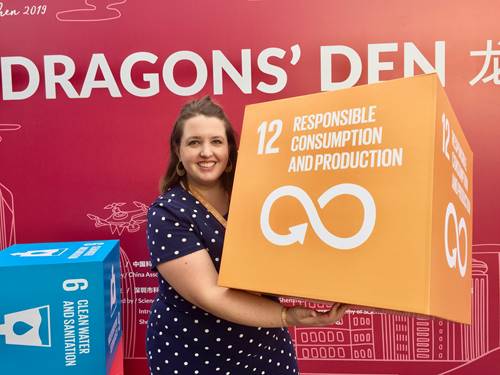 Kathleen recently joined the Washington Oregon Higher Education Sustainability Conference (WOHESC) Program Committee to collaborate on and to add input and impact to our 2021 conference program. Her role on the WOHESC PC Team includes sharing regional campus priority program topics and content, recommending stand out speakers, case studies and regional initiatives and helping to drive and promote campus involvement with the conference.
Kathleen recently joined the Washington Oregon Higher Education Sustainability Conference (WOHESC) Program Committee to collaborate on and to add input and impact to our 2021 conference program. Her role on the WOHESC PC Team includes sharing regional campus priority program topics and content, recommending stand out speakers, case studies and regional initiatives and helping to drive and promote campus involvement with the conference.
She joined Central Washington University in January 2020 in the newly created Sustainability Coordinator role. She has been tasked with developing a comprehensive sustainability vision and plan for the university, while also leading engagement and outreach initiatives. Kathleen lived in Germany for the last four years working on a PhD in Sustainability Science and was excited to take a higher education sustainability position closer to her hometown of Olympia, Washington.
What do you see as our biggest challenge in sustainability work?
I find it challenging at times to balance enthusiastic optimism for sustainability progress with soul-crushing pessimism about the state of our planet. How do we build sustainable communities, encourage activism and propel sustainability progress while being completely overwhelmed at the scope of the problem and the scale of action required? It is easy to face decision fatigue, eco-anxiety, and burnout in this field, so I challenge myself to localize sustainability, identify inroads for participation, and focus on healthy and clean communities.
Advice for people just getting into sustainability work?
Diversify your knowledge and skills base and embrace being a generalist. Be as comfortable talking about GHG emissions and waste reduction as you are talking about stormwater, food insecurity, roof loads for solar panels, and curriculum development. I've found that being knowledgeable about a range of topics opens doors to a greater diversity of conversations and more opportunities to influence campus policies and initiatives.
The most fun you've had in sustainability work?
I recently attended the UNLEASH Innovation Lab in Shenzhen, China, with 1,000 young sustainability leaders from around the globe. It was a fun, intense and energizing week of developing implementable solutions to the SDGs. I walked away from that event reassured that the world has the knowledge, resources, and skills to move towards a sustainable future, if only we can figure out how to remove the economic and political roadblocks.
Interview reposted from WAHESC.
Click here to view the 2020, 2019 and 2018 Blog Entries
 © 2026 | Event by Social Enterprises, Inc.
© 2026 | Event by Social Enterprises, Inc.
PO BOX 31039
Portland, OR 97231
Office | 503.226.2377
Toll Free | 1.855.740.8417